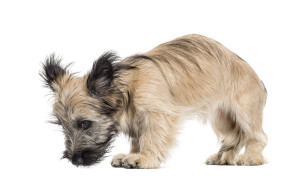 Australia Day is nearly upon us, and the day is celebrated all over Australia, finishing up with spectacular firework displays in many parts of Sydney, including in our own Sutherland Shire.
Australia Day is nearly upon us, and the day is celebrated all over Australia, finishing up with spectacular firework displays in many parts of Sydney, including in our own Sutherland Shire.
But spare a thought for our four-legged friends.
Many dogs (and other pets as well, such as cats, horses and rabbits) can find the loud noises displayed very distressing, because they suffer from fear of noises, leading to noise phobia.
Fear is a natural instinct, and important for our survival. If we encounter a threat or danger, the amygdala, or danger centre in our brain, is activated and our body responds instinctively through a ‘fight or flight’ stress response, by increasing the heart and breathing rate, tensing of the muscles, dilation of the pupils, and the reduction of pain sensation.
Noise sensitivities can escalate and worsen over time, with each exposure, and can turn into noise phobias. Noise phobia is a medical condition which needs veterinary attention. Dogs can be so scared they can harm themselves in their panic (e.g. by escaping and getting hit by a car, by jumping through windows, etc.), do damage to the home (e.g. in the process of trying to escape) .
Early intervention is very important.
When reading your dog’s body language, if early subtle signs of worry and discomfort are recognised, you can act early to support your dog. Subtle signs are usually signs of normal dog behaviour in an abnormal context, such as lip licking, yawning, and a “dry dog body shake”. If you notice these signs during a noise (and this could be the vacuum cleaner, leaf blower, kettle whistling or thunderstorms or fireworks), respond immediately by removing the dog from the noise (if possible), and provide them with something positive such as treats or toys. It is ok to comfort them when they are scared, you are not reinforcing the fear behaviour, and your support will not make them more scared.
We can try to prevent problems by creating positive associations. The most critical time to do this is during the puppy socialisation period. Make sure they have positive experiences (treat rewards, play and/or verbal praise) while getting them used to many different noises such as traffic, vacuum cleaners, and kettle whistles, smoke alarms, etc. But even after the puppy socialisation period, continue to reinforce positive experiences.
What if they have already developed noise phobia?
Noise phobia is a medical condition, not a training or obedience problem. It is important to contact your vet for an assessment and treatment plan.
For mild cases, the following suggestions may help:
- Create a hiding space, or crate train your pet
- Block out the noise by providing “white noise” such as a fan running, or radio or TV, drawing the curtains and closing the windows
- When you can predict the event, such as firework displays, exercise your dog beforehand, to tire him or her out and stimulate the production of endorphins.
- Teach your dog to be calm, ask us how.
- As mentioned before, comforting them is ok, you will not teach them to be more afraid!
For more severe cases, veterinary attention is needed. We can help you with behaviour modification (such as counter-conditioning and desensitisation) and assess the need for medication as well.
We wish everyone a Happy Australia Day and hope these tips help you, and your pet survive the fireworks and stormy seasons!
